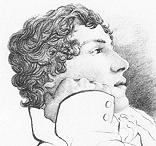The Odes by John Keats
Page 7 of 9 - 1 2 3 4 5 6 7 8 9 Purchase full notes for £4.95 (aprox $7.72)
ODE TO A NIGHTINGALE
Whereas the inspiration for Ode to Psyche was literary, Keats’ host in Hampstead records the actual event that lead to the composition of Ode to a Nightingale :
In the spring of 1819 a nightingale had built her nest near my house. Keats felt a tranquil and continual joy in her song; and one morning he took his chair from the breakfast table to the grass plot under a plum tree, where he sat from two or three hours. When he came into the house, I perceived he had some scraps of paper in his hand, and these he was quietly thrusting behind the books. On inquiry, I found those scraps, four or five in number, containing his poetic feeling on the song of our nightingale. (Charles Brown)
Despite Brown’s comment that Keats “felt a tranquil and continual joy” in the nightingale’s song, the opening of the Ode admits discomfort and dissatisfaction. “My heart aches” is as much a physical complaint as an expression of soulful yearning; he is experiencing an unpleasant numbness which “pains” his senses – so unpleasant that he compares it with the imagined experience of taking poison, or “some dull opiate” – a particularly mind-numbing narcotic – that will cause him to pass out. The heaviness of Keats’ mood contrasts painfully with the light-hearted nightingale, who is, at first, an annoyance (“too happy in thine happiness”). The root of his feeling for the nightingale though is a desire to be the same, to be that free and that creative and that energised ; a desire which, according to the poem, is not “envy” but, at least, some wish to emulate.First, the poet, intent on satisfying this desire, turns to that most familiar stimulant of the creative mind, alcohol. Alcohol is, in truth, a depressant, like opium, but Keats dramatically contrasts the two: opium and hemlock lead one to be enervate, immobile, uncreative; alcohol is associated with beautiful flowers, “Dance, and Provençal song, and sunburnt mirth.” It cheers, enlivens, stimulates, so that Keats, if he were to drink deep, would be as happy as the nightingale. He calls his imagined beaker of red wine “the blushful Hippocrene.” The true Hippocrene is the fountain of the Muses on Mount Helicon, so Keats believes that wine is the water of inspiration for him, allowing him to sing, like the nightingale “in full-throated ease.” In fact, the beaker of wine he imagines is like a magic potion, allowing him immediately to “leave the world unseen.”

